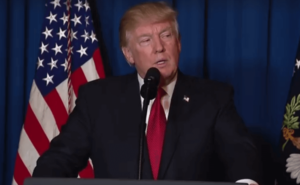by The Cowl Editor on February 28, 2019
News

By Malena Aylwin ’22
Last Friday, President Trump declared the situation on the southern border of the United States to be a national emergency.
Trump announced the national crisis to obtain the billions of dollars that Congress would not approve to build a border wall, generating a highly charged constitutional crisis. The National Emergencies Act of 1976, bill gives presidents a chance to issue a crisis revelation. However, this can only happen with specific requirements.
In 2009, President Barack Obama declared a state of national emergency for the H1N1 swine flu pandemic. That emergency, which expired a year later, allowed for waivers of some Medicare and Medicaid regulation.
A national emergency is an event that threatens the security of the people of the United States. Trump’s declaration topped a two-month time span that included the longest government shutdown in U.S. history, at 35 days; the reemergence of Democrats as a political power; and a Republican party caught between taking signals from Trump and resisting his impulses.
According to U.S. law, a president can divert funds to a federal construction project during a declared national emergency. His ultimate goal is to designate and divert citizen cash to use it to erect 230 miles of barriers along the U.S.-Mexico border.
In any case, Trump foresees many legal difficulties that will, most likely in the long run, be debated by the Supreme Court. Numerous Democrats and some legitimate researchers have said that Trump cannot announce a national crisis to get funding for the border wall.
In the case of the border wall, the money could come from the budget for the Department of Defense. Under federal law, “un-obligated” money in the Department of Defense’s budget may be used by the military to fund construction projects during war or emergencies.
The president decided not to use the hurricane relief money for Texas or Puerto Rico, an idea that had created furious objections from Republicans and Democrats.
In any case, he communicated no apprehension that redirecting military development cash would postpone ventures profiting the troops like base lodging, schools, and fitness centers.
Democratic power in the House of Representatives earlier this week has voted to overturn Trump’s state of national emergency, meaning they must now convince opposition members in the Senate to join them. Then they would have to get a signature from the president, the same person who declared the emergency in the first place, to override his veto.